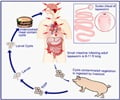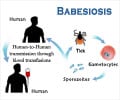A joint study reveals that an animal’s ability to endure internal parasites has a strong influence on its reproductive success.

While all of the animals lost weight as a result of nematode infection, the degree of weight loss varied widely: an adult female sheep with the maximum egg count of 2,000 eggs per gram of feces might lose as little as 2 percent or as much as 20 percent of her body weight. The researchers then tracked the number of offspring produced by each of nearly 2,500 sheep and found that sheep with the highest tolerance to nematode infection produced the most offspring, while sheep with lower parasite tolerance left fewer descendants.
To measure individual differences in parasite tolerance, the researchers used statistical methods that could be extended to studies of disease epidemiology in humans, said senior author Andrea Graham, an assistant professor of ecology and evolutionary biology at Princeton. Medical researchers have long understood that people with similar levels of parasite infection can experience very different symptoms. But biologists are just beginning to appreciate the evolutionary importance of this individual variation.
"For a long time, people assumed that if you knew an individual's parasite burden, you could perfectly predict its health and survival prospects," Graham said. "More recently, evolutionary biologists have come to realize that's not the case, and so have developed statistical tools to measure variation among hosts in the fitness consequences of infection."
Graham and her colleagues used the wealth of information collected over many years on the Soay sheep living on the island of Hirta, about 100 miles west of the Scottish mainland. These sheep provide a unique opportunity to study the effects of parasites, weather, vegetation changes and other factors on a population of wild animals. Brought to the island by people about 4,000 years ago, the sheep have run wild since the last permanent human inhabitants left Hirta in 1930. By keeping a detailed pedigree, the researchers of the St Kilda Soay Sheep Project can trace any individual's ancestry back to the beginning of the project in 1985, and, conversely, can count the number of descendants left by each individual.
 MEDINDIA
MEDINDIA



 Email
Email





